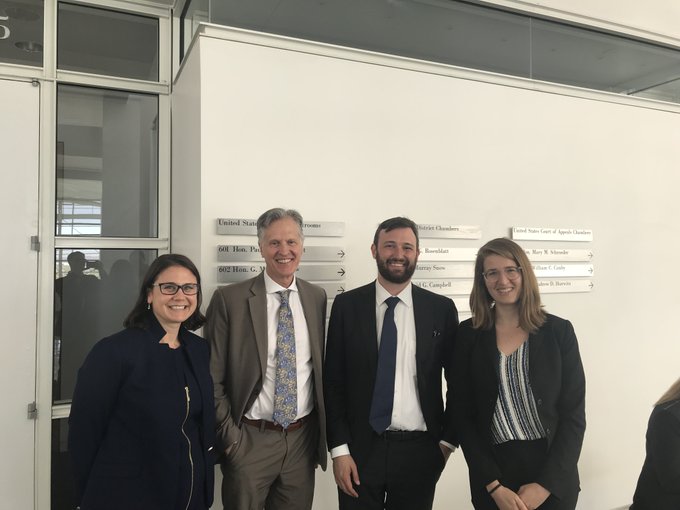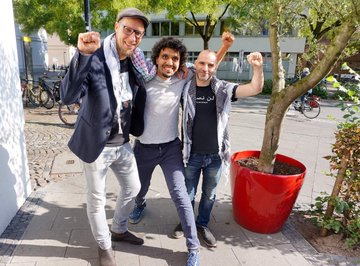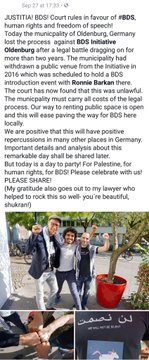Federal court blocks anti-BDS law in Arizona

Citing First Amendment violations, a federal judge in Arizona on Thursday blocked enforcement of the state’s 2016 law that aims to thwart the boycott, divestment and sanctions (BDS) movement for Palestinian rights.
The law required state officials to produce a blacklist of companies, organizations and other entities that are banned from state contracts because of their alleged support for boycotting Israel.
Arizona is now the second state, after Kansas, where Israel and its supporters have been dealt a major legal blow to their efforts to muzzle Americans who support Palestinian rights.
“A restriction of one’s ability to participate in collective calls to oppose Israel unquestionably burdens the protected expression of companies wishing to engage in such a boycott,” US District Court Judge Diane J. Humetewa wrote in Thursday’s order blocking the Arizona law.
“The type of collective action targeted by the [law] specifically implicates the rights of assembly and association that Americans and Arizonans use ‘to bring about political, social and economic change,’” the judge added.
A federal court heard arguments on the law in May.
Earlier this year, a federal judge blocked a state law in Kansas, citing similar concerns over free speech rights.
The Kansas law was amended last Spring so that it does not apply to individuals, but the American Civil Liberties Union (ACLU) has said that it remains unconstitutional.
“No business”
Thursday’s ruling “supports the notion that the government has no business telling people – even people who contract with the state – what causes they can or can’t support,” said Kathy Brody, legal director of the ACLU’s Arizona chapter.
The ACLU filed a lawsuit challenging the law last December, calling for it to be struck down for violating the First Amendment.
The suit was filed on behalf of an attorney who contracts with the government to provide legal advice to incarcerated persons in Coconino County Jail, according to the civil rights group.
The attorney, Mikkel Jordahl, told the ACLU that he is an active participant in a consumer boycott of Israeli goods and wishes to “extend his boycott [activities] to his solely owned law firm” and provide legal services to organizations engaged in boycotts – something a state contractor could not do if the law stood.
In March, the Council on American-Islamic Relations filed a second lawsuit against the state’s anti-BDS law on behalf of a UC Berkeley lecturer who was invited to speak at Arizona State University.
He was given a contract that included a clause requiring speakers to certify they are not engaged with the BDS movement.
The lecturer, Hatem Bazian, who refused to sign the agreement as written, was eventually allowed to speakand the anti-BDS clause was omitted.
Arizona is one of 25 states which have adopted anti-BDS measures, and legislation is pending in Congress.
In May, human rights activists celebrated the failure of a measure that would have punished supporters of the BDS campaign in Missouri.
The bill would have denied state contracts worth $10,000 or more to businesses and organizations that support the Israel boycott.
Activists said that the legislation’s failure was a direct result of months of grassroots pressure on lawmakers and testimonies during committee hearings.
Rights groups called the legislation “constitutionally indefensible” and “a McCarthyite political litmus test on any company or nonprofit organization that wants to enter into a contract with the state.”
Free speech victory in Germany
Meanwhile, in Germany, a court ruled that the city of Oldenburg unlawfully prevented a group from using a public venue for an event featuring BDS activist Ronnie Barkan in 2016.
The judge said the municipality in the northwestern state of Lower Saxony illegally interfered with freedom of assembly and freedom of expression.
The ruling was celebrated by BDS activists in Germany, who have been resisting government crackdowns on Palestinian rights activism and BDS campaigning.
German court rules that withdrawing public venue to #BDS inititiative by Oldenburg muncicipality was unlawful. The decision interfered with freedom of assembly & expression. Oldenburg has to pay costs of legal process. #RuleOfLaw #BDS nwzonline.de/oldenburg/poli…







